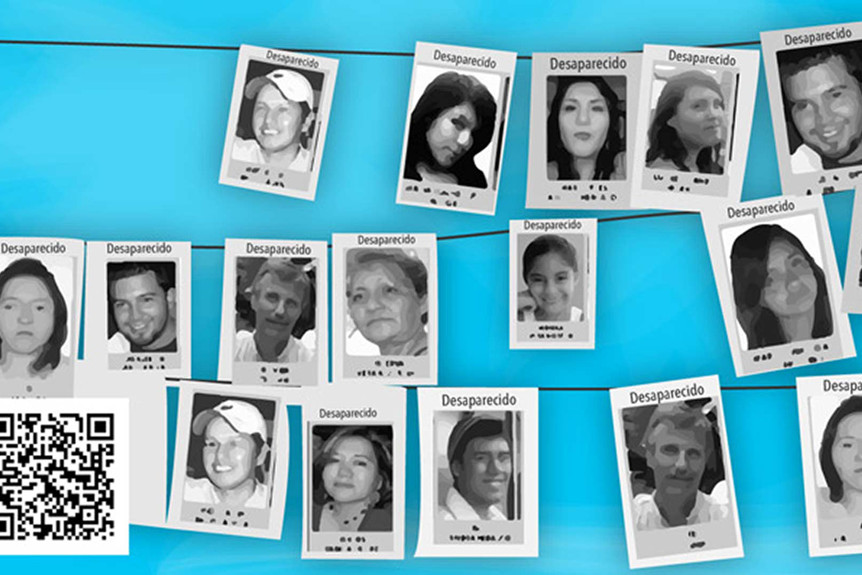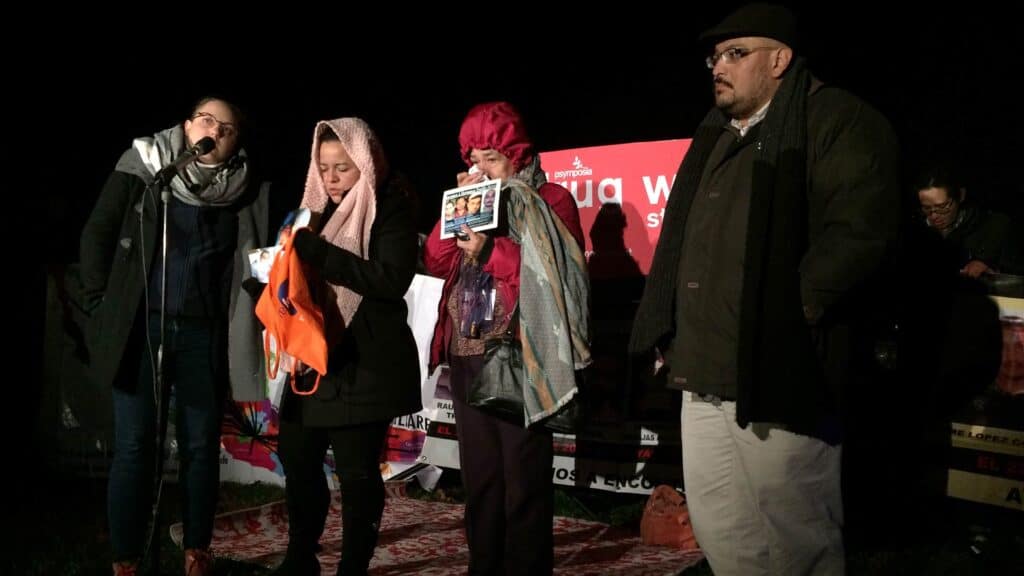The families in México who’ve experienced the real consequences of drug prohibition.
The families of the disappeared people have had to organize among themselves, do their own investigations, and push state agents such as the police, judges, and the general attorney to do their job.

Psymposia is a 501(c)(3) nonprofit research and media organization that offers critical perspectives on drugs, politics, and culture. We rely on contributions from our readers and listeners. Your support is vital to sustaining Psymposia.
Support Psymposia’s independent journalism on Patreon and help us drive the Mystery Machine! We’re a bunch of meddling kids who are unmasking the latest shenanigans on the psychedelics beat.
To end the War on Drugs, we must find our missing loved ones.
It’s been 10 years since President Felipe Calderón declared the Mexican version of the War on Drugs, “la guerra contra el narco.” But this is not a unique war, and there are so many national and international institutions involved that it is becoming more complex by the year.
Since Nixon declared the War on Drugs in 1971, there have been several US-led experiments throughout Latin America. Colombia and México may offer the best examples of how the global War on Drugs has been implemented in the region. Both México and Colombia experienced a dramatic increase in violence after drug cartels were “confronted” by the state, and there are documented cases of US agencies supplying guns to drug cartels.
Corruption, impunity, violence, and a lack of trust for public institutions are just some of the consequences of drug prohibition, as these elements break apart the fundamental characteristics of any democratic government.
2016 was the most violent year in México since Enrique Peña Nieto became president. The government he’s led has been subject to a seemingly endless chain of “unfortunate events,” such as the extrajudicial massacres of suspected gang members by both the army and federal police, the mass disappearance of the 43 young students and activists of Ayotzinapa carried out by local police and criminal organizations, the continuous murders of journalists and activists, corruption scandals, and a series of international diplomacy “mishaps.” As violent murders became the mark of Felipe Calderón’s time in power, forced disappearance has become one of the hallmarks of Peña Nieto’s legacy.
Historically, forced disappearance has been used as a fear-producing strategy because the level of fear it generates impacts not only the victim but also the family and their community, and it can be perpetrated by state agents or independent people acting with support of the state. This phenomenon is usually linked to political or ideological targets, however in recent decades, its use has increased on a global scale as a way to produce widespread terror.
For context, this means that more than 28,000 families and communities in México have been brutally disrupted, and statistics suggest that at least 99 percent of the cases will remain unpunished. The families of the disappeared people have had to organize among themselves, do their own investigations, and push state agents such as the police, judges, and the general attorney to do their job. Familiares en Búsqueda María Herrera (Relatives on the Search María Herrera) is one of the organizations that has been at the forefront of this painful process.

One month after the forced disappearance of 43 students in Iguala, Guerrero, in September 2014, mass graves were found near the city. Despite searching the graves, the missing students were not found, and as a result, other families of disappeared people decided to expand their search for their loved ones.
The Red de Enlaces Nacionales (REN) was conceived at this moment. The REN is a network of organizations created by families of missing persons, and their primary focus is to find lost loved ones. There are a number of strategies used by the network; some dig up clandestine graves, others look in prisons, hospitals, mental-care facilities, and shelters for migrants and the homeless. Many provide legal, strategic, and emotional counsel to families that have recently lost loved ones, and some organize to strategically pressure institutions that may be implicated in the disappearances. Many instances of missing persons can be followed across national borders, and are often connected to human trafficking and forced-labor networks.
The REN has succeeded in finding a number of victims, although unfortunately most of them are not alive. However, the certainty of knowing that the person you love is no longer suffering can be a relief in a very tragic way for many families, as it allows them to fully come to terms with their loss.
Currently, the primary effort of the REN is focused on the National Brigade in Search of Disappeared People (NBSDP), which works to cooperate with independent forensic organizations to identify the victims of forced disappearance.
The Brigade is organized by relatives of disappeared people and volunteers who support in legal, psychoemotional, forensic, security, and logistical areas. During two previous campaigns it found 15 mass graves in the state of Veracruz. Veracruz is an important area for criminal organizations, as it lies between migration routes from Central America and vulnerable sites for oil extraction. This is the place where drugs, oil, and human trafficking collide. Lack of state authority, coupled with the impact of the drug war, has created a hellhole that expands towards Tamaulipas, the state to the north of Veracruz, and to the United States’ border. The bodies found here are currently being processed by forensic experts and will hopefully be identified and returned to their families.
More recently, the NBSDP began searching in the state of Sinaloa from January 21st to February 4th.
Between 50-80 people, including activists, non-profit organizations, experts, and family members assisted in Sinaloa by performing fieldwork on the ground. However, many others supported the effort directly from their home states—whether it is by donating food, materials (shovels, boots, tools), organizing funding events or online campaigns, or even in providing counseling or workshops for specific necessities like psychological and emotional support, conflict resolution, forensics, or legal advice. Some universities have offered support with either research projects or workshops with the organizations.
The campaign in Sinaloa resulted in the finding of three buried persons in clandestine graves, hopefully allowing their families to receive, bury, and mourn their lost ones after an identification process. However, the biggest success of the Brigade was in motivating local society to join the network and strengthen the movement.
Sinaloa is home to one of the world’s largest illegal drug companies, and the state economy largely relies on the drug trade—so looking for disappeared people in this context allowed for the Brigade to make the statement that the search for the missing people is without judgment, stigmatization, or criminalization of the victims; under the belief that whoever is buried underground must be brought back to their family, and if they had committed a crime they should’ve faced justice and had a fair trial.
One of the activities of the Brigade is to receive and document cases of families who have not been involved in any organization process. The testimonies of these families has shed light on the fact that most disappearances are perpetrated by the municipal police— either by their own initiative or through the instructions of an illegal drug company.
Forced disappearance is a crime that impacts families in many ways, particularly with a government that refuses to acknowledge the humanitarian consequences of the War on Drugs, and that does nothing to address critical issues that are related. Civil society initiatives, restorative justice, and harm reparation are becoming more necessary with each passing day. However, it is drug policy reform that will be most necessary if we truly want to dismantle the economic, political, and muscle power of criminal organizations and their international networks.
The War on Drugs in México has broken thousands of families, and its impact goes beyond what we can even imagine. The children and young people growing up in this environment do not remember a peaceful México like older generations do. Violence, corruption, and social isolation have substituted peace, safety, and community; so it is now our turn to rebuild our communities and rebuild trust in one-another. Finding those who have been forcefully disappeared is absolutely necessary in order to bring closure to hundreds of thousands of communities who have been disrupted, and without this closure it will be nearly impossible to reconcile as a society.
As our era becomes more violent by the day, in nearly every corner of the world, we need to develop the ability to show our children, and future generations, that we can be empathetic and love one another. Solidarity, respect for each other, and the struggle to preserve life over everything else are values that need to be shared and spread beyond boundaries, and the Brigade goes to the most violent and complex places to carry this message of peace.
Hey! Before you go… Psymposia is a 501(c)(3) non-profit media organization that offers critical perspectives on drugs, politics, and culture. We strive to ask challenging questions, and we’re committed to independent reporting, critical analysis, and holding those who wield power accountable.
Our perspectives are informed by critical analysis of the systemic crises of capitalism that have directly contributed to the unmitigated growth of addiction, depression, suicide, and the unraveling of our social relations. The same economic elite and powerful corporate interests who have profited from causing these problems are now proposing “solutions”—solutions which both line their pockets and mask the necessity of structural change.
In order for us to keep unpacking these issues and informing our audience, we need your continuing support. You can sustain Psymposia by becoming a supporter for as little as $2 a month.
Miguel Villegas
Miguel Villegas is member of ReverdeSer Colectivo in México. Their harm reduction work aims towards broader social change and engagement in constructing a culture of peace, restorative policies and the preservation of traditional knowledge and practices from indigenous communities.





